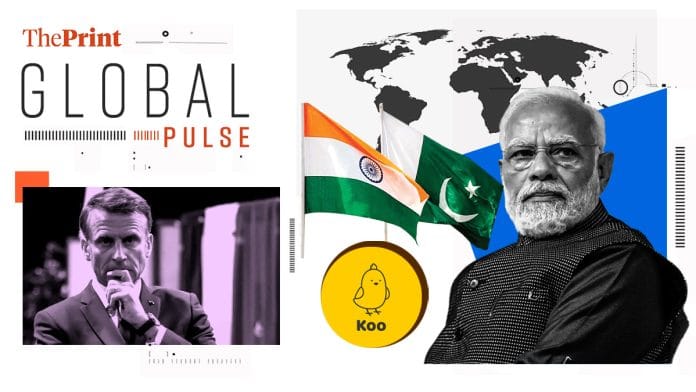New Delhi: India denied the Bharatiya Janata Party (BJP) a majority to bring back a coalition government, and it remains to be seen how Narendra Modi responds to this “popular reprimand” in his third term as Prime Minister, Bloomberg columnist Howard Chua-Eoan writes in his opinion piece — ‘India is back to the old normal. Get used to it.’
The BJP turned Modi’s “smiling but obdurate mien into a cult of personality — the strongman who promises prosperity as long as you go along with his policies and politics”, with political stability under Modi’s stewardship attracting “risk-averse” global investors, writes Chua-Eoan. However, “voters in the world’s largest democracy want the needle of economic distribution to move a little away from capital and toward labour”, he writes, quoting his colleague Andy Mukherjee. Though this has “rattled” investors, “an increase in the risk premium is acceptable if the end result is more widespread prosperity,” Chua-Eoan points out.
“Shock, delight, hope, worry, resignation” — Indian Americans experienced a range of emotions as Modi and the BJP’s setback in the polls caught them by surprise, The Washington Post’s Anumita Kaur reports.
“For some, the shift in Indian politics suggests a positive step to support the country’s diversity. Others said it could put India’s economic growth at risk — or won’t change much at all,” reports Kaur. The mandate, she writes, has renewed hopes for India’s democracy and checked anxieties around minority rights among Indian Americans such as Syed Ashraf from Virginia and Balwinder Singh from Washington D.C. while raising fears of economic instability among others such as Virginia’s Raj Prasannappa.
Modi and his party will continue to wield significant power over the next five years, writes The Christian Science Monitor correspondent Fahad Shah in the report — ‘Even before his latest victory, Modi was reshaping India. These numbers show how — with an overview of India’s performance over the past 10 years.
The report says India has had an annual GDP growth rate averaging 5.6% from 2014 to 2022, and extreme poverty has reduced from 18.7% in 2015 to 12% in 2021. However, the unemployment rate reached a 45-year high of 6.1% in 2017-2018 and surged to 20.8% during COVID-19 before decreasing in recent years, writes Shah. He also writes about “significant strides” in infrastructure development and a “welfare boom” through direct cash transfers to bank accounts and affordable food grains. However, India’s 21-spot fall in the Press Freedom Index rankings, he says, highlights growing restrictions on dissent, which experts believe will continue during Modi’s third term.
A Rest of World report, ‘The rise and fall of Koo, India’s once-thriving Twitter alternative‘, delves into how India’s first-ever microblogging platform Koo “went from booming international expansion to near closure in just four years”. India-based independent journalist Varsha Bansal highlights the story of Mukul, who joined Koo in early 2023 to work on the app’s features, only to be laid off in June due to severe downsizing.
When Aprameya Radhakrishna and Mayank Bidawatka founded the app in 2020, the aim was to rival X by catering to India’s diverse languages. But, Koo struggled with monetisation, leading to workforce cuts and founders paying salaries from their private funds. Speaking with Bansal, experts note that Koo, which lacks a clear differentiator, failed to maintain user engagement. Now, the company is in talks for an acquisition. “They should have been clear [while hiring me] that such a situation may happen because, as a company, you know where it’s going,” Mukul says.
In an opinion piece for Dawn, ‘Modi’s guarantee’, former foreign secretary of Pakistan Aizaz Ahmad Chaudhry writes that Modi has vowed to continue his government’s work that has led to significant economic growth and infrastructure development despite criticisms over democratic backsliding, unemployment and inflation.
In his third term, Modi may not take any positive initiatives towards Pakistan but would want a stable western border so he could focus on his economic vision and goals, writes Chaudhry. “Should he change his mind and approach Pakistan for limited cooperation, Pakistan should respond positively. Meanwhile, it should focus all its energies inwards to achieve a degree of political stability, continuity of economic policies, and human development in pursuit of a clear vision and positive strategy for the country,” he says.
Gaza ceasefire resolution & elections in France
The UN Security Council Monday adopted a US-backed ceasefire plan for Gaza as Russia abstained in a move that throws light on the growing frustration over the war. To know more, read this New York Times report.
France’s political parties held talks to sound out potential allies Monday as the country heads to the general elections called by Emmanuel Macron after he was roundly defeated in the European parliamentary elections. To know more, read this The Guardian report.
(Edited by Madhurita Goswami)






